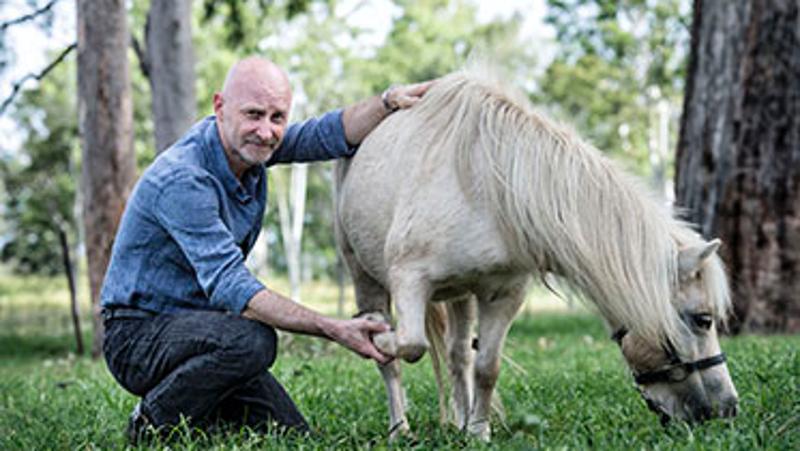
New owners are being sought for 40 healthy ponies that have been participating in clinical trials conducted by QUT.
They were among 100-plus ponies involved in research to treat Equine Metabolic Syndrome and prevent laminitis - a common and potentially deadly hoof condition which afflicts thousands of horses throughout Australia.
Professor Martin Sillence from QUT's Science and Engineering Faculty (Earth, Environmental and Biological Sciences School) said the ponies that need new homes are all in good condition and not suffering from laminitis, a complex and extremely painful condition which can crush the soft tissue at the base of the hoof.
"In extreme cases the horse can become crippled with euthanasia being the end result and unfortunately it is all too common," Professor Sillence said.
"Laminitis led to the death of Jimmy, the $5 million colt and half-brother to legendary race horse Black Caviar.
"The most wide-spread form of laminitis is associated with Equine Metabolic Syndrome and high energy diets, particularly those rich in sugar and other non-structural carbohydrates.
"Thanks to modern husbandry practices and improved pasture quality, overfeeding has become common and equine obesity is approaching epidemic proportions.
"QUT has joined forces with the University of Queensland, Charles Sturt University in NSW and the University of Melbourne to form an Australian Laminitis Research Network to develop what we hope will be the world's first treatment for equine laminitis.
"There are 1.2 million horses in Australia and the equine industry contributes well over $1 billion annually to the nation's economy.
"There's been an explosion in laminitis in the last 40 years, coinciding with when we started to improve pastures and the type of feed horses and ponies are given.
"The change in diet causes higher insulin levels in all horses, but in certain individuals the insulin levels get totally out of control. We found that laminitis is somewhat related to human diabetes, but unlike humans, the horse pancreas never fails and instead continues to pump out insulin until toxic levels are reached."
Professor Sillence said the research team had received a $140,000 qutbluebox proof-of-concept investment in 2013 and has since secured a further $2.1 million in research funding from sponsors in Australia, the US and Europe to work on new treatments for laminitis.
"Having recruited more than 100 ponies for a series of clinical trials using a new compound to treat Equine Metabolic Syndrome and prevent laminitis, we are now approaching the end of this phase of the work and are hoping that these animals will go to responsible and caring owners," Professor Sillence said.
"The aim of our studies has been to lower the ponies' insulin levels, and in particular to prevent the exaggerated insulin response that occurs in some ponies when they consume a sweet feed.
"We have also been testing new weight loss strategies that encourage the animals to take more exercise. Overall, our goal has been to accurately identify ponies at risk of laminitis and restore these animals to a healthier metabolic state.
"Many of the animals originally purchased for the study were shown not to produce high insulin levels when our clinical tests were performed, whereas others were clearly at risk of the disease. This taught us that the appearance of a pony is a very poor predictor of its metabolic health.
"The ponies have all received excellent veterinary care during their time with us, including Hendra vaccination, de-worming, dental and hoof care, so they are leaving us in good condition. Some of these animals may be good to ride, whereas others are more temperamental and will need careful handling.
"Now we are seeking responsible, experienced horse owners who can offer these animals the future they deserve, after contributing so much to our understanding of this devastating disease."
Anyone interested in purchasing a pony should email the veterinarian in charge, Dr Alexandra Meier (a.meier@qut.edu.au) to enquire about the cost and availability of them between now and July 2015.
More information is also available at https://www.facebook.com/pages/University-Pony-Adoptions/913000312078675
Media contact:
Amanda Weaver, QUT Media, 07 3138 9449, amanda.weaver@qut.edu.au
After hours: Rose Trapnell, 0407 585 901, media@qut.edu.au




